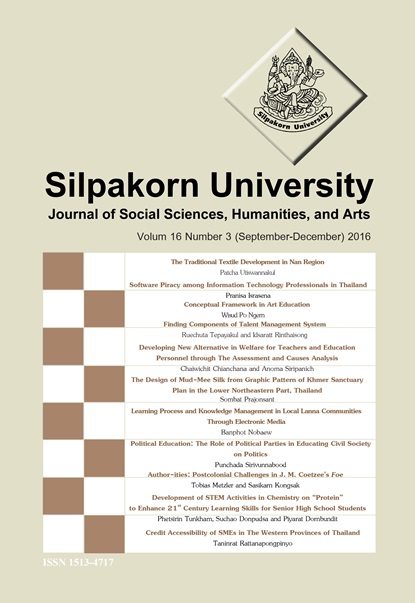Development of STEM activities in Chemistry on “Protein” to enhance 21<SUP>st</SUP> century learning skills for senior high school students
Main Article Content
Abstract
This study aimed to develop STEM education activities on “Protein” for high school students and study efficiency of STEM activities for enhancing the 21st century skills including on learning and innovation skills in creativity, information media and technology skills and life and career skills of students. The evaluating result from the experts showed that developed STEM education activities was ranked in high score level. The STEM education activities efficiency E1/E2 was 85.65/89.52 that higher than the criteria of 80/80. The STEM activities was used by 42 students in grade 12 in the first semester of the academic year 2015 at Bodindecha (Sing Singhaseni) School. Sampling group was chosen using a purposive sampling approach. The results revealed thatafter students studied STEM activities, the academic achievement and the 21st century skillson learning and innovation skills in creativitywas significantly higher at .05 level, information media and technology skills of students were ranked in excellent level and life and career skills of students were ranked in very good level.
Downloads
Article Details
All rights reserved. Apart from citations for the purposes of research, private study, or criticism and review,no part of this publication may be reproduced, stored or transmitted in any other form without prior written permission by the publisher.
References
Californians Dedicated to Education Foundation. (2014) Innovate. California: n.p.
Chan, S. and Yuen, M. (2014) Creativity Beliefs, Creative Personality and Creativity-Fostering Practices of Gifted Education Teachers and Regular Class Teachers in Hong Kong. Thinking Skills and Creativity(14): 109-118.
Christensen, R., Knezek, G. and Tyler-Wood, T. (2014) Student Perceptions of Science, Technology, Engineering, and Mathematics (STEM) Content and Career. Computers in Human Behavior 34: 173-186.
Dugger, W. E., Jr. (2010) Evolution of STEM in the United States. 2010: 1-3.
Gonzalez, H. B. and Kuenzi, J. J. (2012) Science, Technology, Engineering, and Mathematics (STEM) Education: A Primer.
Guilford, J. P. (1966) Intelligence 1965 Model. American Psychologist 21(1): 20-26.
Karsli, F. and Ayas, A. (2014) Developing a Laboratory Activity by Using 5e Learning Model on Student Learning of Factors Affecting the Reaction Rate and Improving Scientific Process Skills. Procedia Social and Behavioral Sciences 143: 663-668.
Partnership for 21st Century Learning. (2009) P21 Framework Definitions. 2009: 1-9
Partnership for 21st Century Skills. (2008) 21st Century Skills, Education & Competitiveness A Resource and Policy Guide. [Online URL: www.21stcenturyskills.org] accessed on January 25, 2016.
Peter, D. and Renee, M. (2014) CSI-Chocolate Science Investigation and the Case of the Recipe Rip-Off: Using an Extended Problem-Based Scenario to Enhance High School Students’ Science Engagement. Journal of Chemical Education 91: 345-350.
Pheeraphan, N. (2014) Development of Information and Communication Technology Usage Model for 21st Century Learning Skills in Higher Education. Research Education Prince of Songkla University 25(3): 19-34.
Sahin, M. (2009) Instructional Design Principles for 21st Century Learningskills. Procedia Social and Behavioral Sciences 1(1): 1464-1468.
Sailamai, B. and Samahito, C. (2015) The Development of Creative Thinking for Preschool Children Through STEM Education Learning Experience Provision on Local Careers in Songkhla Provice. Academic Services Journal Prince of Songkhla Universirty 26(2): 104-110.
Saribas, D. (2009) Is It Possible to Improve Science Process Skills and Attitudes towards Chemistry through the Development of Metacognitive Skills Embedded within a Motivated Chemistry Lab?: A Self-Regulated Learning Approach. Procedia Social and Behavioral Sciences 1(1): 61-72.
Siripatharachai, P. (2013) STEM education and 21st Century Skills Development. Executive Journal 33(2): 49-56.
The Lund Press. (1973) Encouraging Creativity in the Classroom. Lowa: WM. C. Brown Company Publishers.
Turiman, P., Omar, J., Daud, A. M. and Osman, K. (2012) Fostering the 21st Century Skills through Scientific Literacy and Science Process Skills. Procedia Social and Behavioral Sciences 59: 110-116.
Wilson, Z. S., Mc Guire, S. Y., Limbach, P. A., Doyle, M. P., Marzilli, L. G. and Warner, I. M. (2014) Diversifying Science, Technology, Engineering, and Mathematics (STEM): An Inquiry into Successful Approaches in Chemistry. Journal of Chemical Education 91(11): 1860-1866
Wiswalla, M., Stiefelb, L., Schwartzb, A. E. and Boccardoc, J. (2014) Does Attending a STEM High School Improve Student Performance? Evidence from New York City. Economics of Education Review. 40: 93-105.
Wittaya, S., Pingaew, R. and Dornbundit, P. (2013) Development of Solving Science Problem and Scientific Reasoning by Using Problem-Based Learning. Journal of Humanities and Social Sciences Mahasarakham University 32(3): 70-82.


